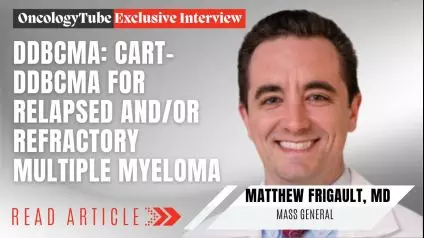Car- T DDBMCA
By Matthew Frigault, MD
Car T cell DDBMCA is a autologous chimeric enogen receptor T-cell. So it’s a type of an immunogen therapy that targets BCMA, which is antigen on multiple myeloma. It is a first.
Study until this hasn’t been used in other patients for other reasons or other indications. There are other BCMA car T-cell therapy but this is built differently to hopefully be more effective. And it is a phase 1 dose escalation first in human study.
So this was we looked at patients who were defined as relapse refractory. So it had at least three or prior lines of therapy and had to have been exposed to the three major classes of multiple myeloma therapies. As it turns out, the median number of prior lines was actually four, and we had patients up to having 16 different lines of therapy for multiple myeloma.
We’re seeing a 100% response rate.
I think this is important because, in relapse refractory multiple myeloma setting for patients who are pen to refractory triple refractory we really don’t have many options. These folks have a median overall survival that’s counted on the order of months. And so the fact that we’re seeing a 100% response rate and we haven’t met our median pfs was 17 months of follow up.
Very optimistic that we’ll have another gun to add to the arsenal
We are very optimistic that we’ll have another gun to add to the arsenal. In terms of BCMA directed cell therapies currently in this setting, we have two commercially available. We have IDE-cel and we have Silta cell. Both are BCMA products. We did just have ttab, which is a BC m a bite that was approved.
But given limitations in manufacturing, we still have very long wait list for patients to get access to therapies like this.
So it’s a standard of three plus three, phase 1. So we started at dose level, one of a hundred million cells, just like with other cellular therapy trials. Patients get chemotherapy for three days daily. Five, four and three, they get two days off and on day zero is when they get their cell infusion.
We were pre, primarily the primary endpoints were actually safety here. We did look at overall pfs overall survival response rates, but it was primarily set up for dose escalation. So three plus three, three patients followed by another three patients. And dose level two, we treated six patients in dose level two and elected to go at dose level one for a recommended phase two dose.
Big key take homes is that every patient responded. We had a 100% overall response rate. We had about an 81% complete response rate in patients who were had at least 18 months of follow up. We saw durable responses deepening over time and we have not met our median pfs Mainly this was just to evaluate safety and efficacy. We were able to evaluate and determine our recommended phase two dose, and we have infused our first patient on the pivotal study, which we hope will lead to regulatory approval of ddbmca in Relapser Ractor multiple myeloma.
The big questions really are when can we get slots , because we’re so limited in what we have I think patients typically look at high risk features associated with this patient population, extramedullary disease, high tumor burden. Questions that do come up are actually safety, and we actually didn’t see any severe CRS in our recommended phase two dose of a hundred million cells.
The biggest thing is around, what is the durability of the responses. Again, I mentioned that we have patients now, well beyond 18 months, patients, almost 30 plus months out. And we didn’t see any severe crs. And we only had a single event of neurotoxicity in the 38 patients treated for severe neurotox.
It’s a highly effective product. It was given safely to a large number of patients in a relapse refractory setting with high risk features. And we’re hoping that this is an improved product that’s gonna increase accessibility of car t cell therapy to multiple myeloma patients.
About The Author: Matthew Frigault, MD
Medical Education
-
MD, University of Pennsylvania Perelman School of Medicine
-
Residency, Johns Hopkins Hospital
-
Fellowship, Dana Farber Cancer Institute
American Board Certifications
-
Internal Medicine, American Board of Internal Medicine
-
Medical Oncology, American Board of Internal Medicine

